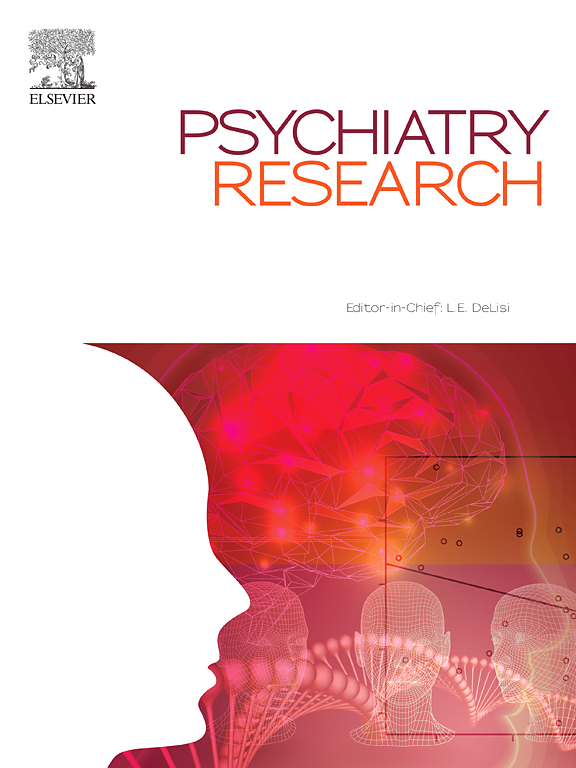Low-grade inflammation, cognitive dysfunction, impulsivity, and appetite hormone dysregulation in adolescents with attention deficit hyperactivity disorder
IF 3.9
2区 医学
Q1 PSYCHIATRY
引用次数: 0
Abstract
Background
Research has identified an inflammatory biotype of attention deficit hyperactivity disorder (ADHD). However, the relation between low-grade inflammation (LGI), subjective clinical symptoms, appetite hormone regulation, and cognitive function in adolescents with ADHD remain unclear.
Methods
In all, 88 adolescents with ADHD and 65 healthy adolescents participated in this study. Low-grade inflammation was defined using biochemical criteria (C-reactive protein levels ≥ 3 mg/L) or phenotypic criteria (body mass index ≥ 30 kg/m2). All adolescents answered questions on the Barratt Impulsiveness Scale (BIS) and completed two cognitive tasks: the go/no-go task and the Wisconsin Card Sorting Test (WCST). Parents answered questions on the Swanson, Nolan, and Pelham IV (SNAP-IV) scale for their children’s attention and behavior symptoms.
Results
Among the adolescents with ADHD, 16 (18.2 %) were categorized into the low-grade inflammation group. Generalized linear models, adjusted for age, sex, and SNAP-IV scores, revealed that adolescents with ADHD and low-grade inflammation had the highest self-reported overall impulsiveness (BIS total scores; p = 0.006), inattention (BIS-attention subscale scores; p = 0.005), and poor self-control (BIS-self-control subscale scores; p = 0.006). Additionally, this group had the highest insulin (p = 0.003) and leptin levels (p < 0.001) relative to the control group and to the group with ADHD without low-grade inflammation. Adolescents with ADHD and low-grade inflammation, in particular, exhibited poor cognitive performance as measured by the go/no-go task and WCST.
Discussion
These findings suggest an immune-metabolic subtype of ADHD, indicating that adolescents with ADHD and low-grade inflammation experience more severe impulsivity, disrupted appetite hormone levels, and impaired cognitive function.
青少年注意缺陷多动障碍的轻度炎症、认知功能障碍、冲动和食欲激素失调
研究已经确定了一种炎症型的注意缺陷多动障碍(ADHD)。然而,青少年ADHD患者的低度炎症(LGI)、主观临床症状、食欲激素调节和认知功能之间的关系尚不清楚。方法共88例ADHD青少年和65例健康青少年参与本研究。低度炎症的定义采用生化标准(c反应蛋白水平≥3mg /L)或表型标准(体重指数≥30kg /m2)。所有青少年都回答了Barratt冲动性量表(BIS)的问题,并完成了两个认知任务:去/不去任务和威斯康星卡片分类测试(WCST)。家长根据Swanson, Nolan, and Pelham IV (SNAP-IV)量表回答了孩子注意力和行为症状的问题。结果青少年ADHD患者中,有16例(18.2%)属于轻度炎症组。根据年龄、性别和SNAP-IV评分进行调整的广义线性模型显示,患有ADHD和低度炎症的青少年自我报告的总体冲动性最高(BIS总分;p = 0.006)、注意力不集中(BIS-attention子量表得分;p = 0.005),自我控制能力差(bis -自控量表得分;P = 0.006)。此外,这一组的胰岛素(p = 0.003)和瘦素水平最高(p <;0.001),相对于对照组和无低度炎症的ADHD组。在go/no-go任务和WCST测试中,患有ADHD和轻度炎症的青少年表现出较差的认知表现。这些发现表明ADHD是一种免疫代谢亚型,表明患有ADHD和低度炎症的青少年会经历更严重的冲动、食欲激素水平紊乱和认知功能受损。
本文章由计算机程序翻译,如有差异,请以英文原文为准。
求助全文
约1分钟内获得全文
求助全文
来源期刊

Psychiatry Research
医学-精神病学
CiteScore
17.40
自引率
1.80%
发文量
527
审稿时长
57 days
期刊介绍:
Psychiatry Research offers swift publication of comprehensive research reports and reviews within the field of psychiatry.
The scope of the journal encompasses:
Biochemical, physiological, neuroanatomic, genetic, neurocognitive, and psychosocial determinants of psychiatric disorders.
Diagnostic assessments of psychiatric disorders.
Evaluations that pursue hypotheses about the cause or causes of psychiatric diseases.
Evaluations of pharmacologic and non-pharmacologic psychiatric treatments.
Basic neuroscience studies related to animal or neurochemical models for psychiatric disorders.
Methodological advances, such as instrumentation, clinical scales, and assays directly applicable to psychiatric research.
 求助内容:
求助内容: 应助结果提醒方式:
应助结果提醒方式:


